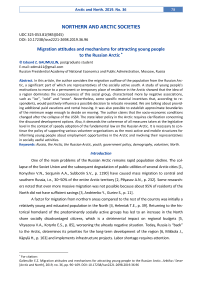Migration attitudes and mechanisms for attracting young people to the Russian Arctic
Автор: Eduard Z. Galimullin
Журнал: Arctic and North @arctic-and-north
Рубрика: Northern and arctic societies
Статья в выпуске: 36, 2019 года.
Бесплатный доступ
In this article, the author considers the migration outflow of the population from the Russian Arctic, a significant part of which are representatives of the socially active youth. A study of young people's motivations to move to a permanent or temporary place of residence in the Arctic showed that the idea of a region dominates the consciousness of this social group, characterized more by negative associations, such as “ice”, “cold” and “snow”. Nevertheless, some specific material incentives that, according to respondents, would positively influence a possible decision to relocate revealed. We are talking about providing additional paid vacations and rental housing. It was also possible to establish approximate boundaries of the minimum wage enough to decide on moving. The author claims that the socio-economic conditions changed after the collapse of the USSR. The state labor policy in the Arctic requires clarification concerning the discussed development options. Also, it demands the coherence of all measures taken at the legislative level in the context of speedy adoption of the fundamental law on the Russian Arctic. It is necessary to continue the policy of supporting various volunteer organizations as the most active and mobile structures for informing young people about employment opportunities in the Arctic and involving their representatives in socially useful activities.
Russia, the Arctic, the Russian Arctic, youth, government policy, demography, volunteer, North
Короткий адрес: https://sciup.org/148318448
IDR: 148318448 | УДК: 325-053.81(985)(045) | DOI: 10.17238/issn2221-2698.2019.36.96
Текст научной статьи Migration attitudes and mechanisms for attracting young people to the Russian Arctic
One of the main problems of the Russian Arctic remains rapid population decline. The collapse of the Soviet Union and the subsequent degradation of public utilities of several Arctic cities [1, Konyshev V.N., Sergunin A.A., Subbotin S.V., p. 1190] have caused mass migration to central and southern Russia, i.e., 30–50% of the entire Arctic territory [2, Pilyasov A.N., p. 232]. Some researchers noted that even more massive migration was not possible because about 95% of residents of the North did not have sufficient savings [3, Andrienko Y., Guriev S., p. 11].
A factor for migration from northern areas compared to the rest of the country was initially a relatively young and educated population in the North [4, Heleniak T.E., p. 39]. Returning to the historical homeland of the predominantly socially active groups has led to an increase in the North share socially disadvantaged citizens, which is a detrimental impact on regional budgets [5, Vityazeva V.A., Kotyrlo E.S., p. 85], worsening the already negative situation. Today, Russia is “back” to the Arctic, determines its priorities for the long-term development of the region [6, Mikkola J., Käpylä H., p. 163] and implements infrastructure projects. Labor shortage requires attention.
∗ For citation:
In the table below, we can see that in most of the Russian Arctic territories has been a steady outflow of population. In absolute terms, the Murmansk Oblast lost more people than the other areas. In 2010–2018, it was 41 852 people. But at the same time, it is the most populated the territory of the Russian Arctic. In percentage terms, the most significant losses are in the Republic of Karelia and the Komi Republic (-17.11% and -19.34% compared to 2010, respectively).
Table 1
Dynamics of the population in the Arctic zone of the Russian Federation in 2010–2018.
|
Territory |
Year |
Total decrease (20102018) |
|||||
|
2010 |
2014 |
2015 |
2016 |
2017 |
2018 |
||
|
Arkhangelsk Oblast |
664,465 |
656,624 |
655,100 |
652,867 |
650,755 |
646,899 |
-17,566 (-2,64%) |
|
Krasnoyarsk Krai |
229,392 |
228,493 |
226,935 |
227,546 |
227,220 |
227,972 |
-1 420 (-0,62%) |
|
Murmansk Oblast |
795,409 |
771,058 |
766,281 |
762,173 |
757,621 |
753,557 |
-41,852 (-5,26) |
|
Nenets AO |
42 090 |
43 025 |
43 373 |
43 838 |
43 937 |
43 997 |
1 907 (4,53%) |
|
Republic of Karelia |
51 634 |
47 432 |
46 186 |
45 070 |
44 301 |
42 799 |
-8 835 (-17,11%) |
|
Komi Republic |
95 854 |
84 707 |
82 953 |
81 442 |
80 061 |
77 314 |
-18,540 (-19,34%) |
|
Republic of Sakha (Yakutia) |
28 325 |
26 488 |
26 182 |
26 147 |
26 210 |
26 063 |
-2 262 (-7,99%) |
|
Chukotsky AO |
50 526 |
50 555 |
50 540 |
50 157 |
49 822 |
49 348 |
-1 178 (-2,33%) |
|
Yamal-Nenets AO |
522,904 |
539,671 |
539,985 |
534,104 |
536,049 |
538,547 |
15 643 (2,99%) |
Territories with positive dynamics: Nenets AO (4.53%) and Yamal-Nenets AO (2.99%). In the Arctic, a minimal decrease had the Krasnoyarsk Krai (-0.62%) and the Chukotsky AO (-2.33%). The most significant outflow of population occurred in the European part of the Russian Arctic, the most urbanized and industrialized one.
The growth of the population in the Russian Arctic was due to the inclusion of some territories of the Republic of Karelia in 2017 (Fig. 1). Without the addition, the decline amounted to about 8 000 people, and, in general, it would be consistent with the general trend [7, Galimullin E.Z., p. 271].
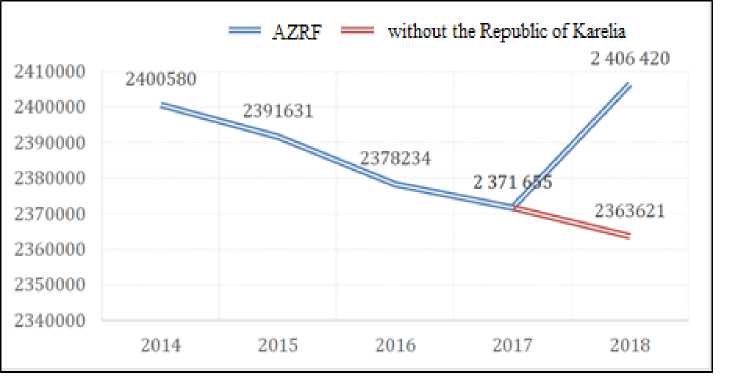
2 371
without the Republic of Karelia
2 406 420
Fig. 1. Dynamics of the population of the Russian Arctic.
We are talking about the outflow since, as the researchers note, the decline of the population is provided mainly by out-migration [8, Ivanova M.V., p. 184]. Moreover, the recent decline comes amid a natural increase that, to some extent, performs compensating function [9, Tatarkin A.I., Loginov V.G., Zakharchuk E.A., p. 15].
Setting up the issue
A survey by the Netherlands 1998 identified three main reasons for the migration in the northern regions: “We have always viewed our presence in the North as a temporary” (29%), “stay in the North became meaningless” (27%) and “want to return to native land, to relatives and friends”(23%) [10]. Today, people are leaving the Arctic due to the reduction of benefits [11, Volgin N.A., Shirokova L.N., Mosina L.L., p. 38] and lack of prospects for further education and work [8, Ivanova M.V.].
Some authors have noted the deeper systemic causes depopulation of the Arctic zone, e.g., a normal interregional differentiation in the socio-economic development [12, Leksin V.N., Porfiryev B.N., p. 988]. Arctic issues, according to some researchers, are the result of nationwide problems, caused by the difficulties of transition to market economy and privatization of state property [13, Andreassen N., p. 82] but: this macro-region of the country to the greatest extent absorbed the socialist policies of the location and development of productive forces [14, Leksin V.N., Porfiryev B.N., p. 117]. So, the problems there require more effort to resolve them.
Most mobile group of population in the Arctic is the youth: the desire of its representatives to receive a quality education, and dissatisfaction with the socio-economic situation and the lack of job prospects correspond to national trends [8, Ivanova M.V., p. 187]. The Soviet Union has built an entire system to attract skilled young workers to the Far North, incl. various kinds of allowances and increased regional coefficients. Recently, the current size of these payments is lower than the differences in the cost of living compare with the average for Russia [11, Volgin N.A., Shirokova L.N., Mosina L.L., p. 40], not to mention the differences in living standards in the broadest sense. However, it is worth noting that the migration attitudes among young people are high, not only in Russia.
The results of a study showed that 74% of young people in the Barents Region seriously think about migration [15, Tuhkunen A., p. 145].
Due to the lack of the fundamental law on the Arctic zone of the Russian Federation, discussions on how to develop the macro-region and a possible rate for shift method, great importance is an understanding of the new motivation of young people for a living and working in the Arctic.
Methods and Results
In October 2018 — January 2019, we and at the Project Office on the Development of the Arctic (PODA) completed a study of the Russian youth (age 18–33; 100 people) living outside the Arctic region. The idea was to identify favorably and, on the other hand, the factors hindering a possible move to a temporary or permanent residence in the Russian Arctic. A specially designed questionnaire included nine questions. Respondents were asked to select one or several answers. The survey had two stages:
-
• October 31: full-time participation and responses to a questionnaire at the “Day of the Arctic” event; the questionnaire was developed within the project supported by the PODA grant, during the Arctic Expedition in Helsinki, September 5–7;
-
• October 1 — January 31: Internet questionnaire (through social networking, friends, and acquaintances of the author from different cities; the relevant target group criteria).
A working hypothesis: modern Russian youth living outside the Russian Arctic is rather poorly informed about the Arctic, but it has fragmented, disparate notions of severe natural conditions and relatively high incomes of northerners. The objectives of the study: determination of current migration sentiments of youth, setting some specific indicators of motivation to live and work in the Arctic, and the data obtained were compared with the results of similar surveys.
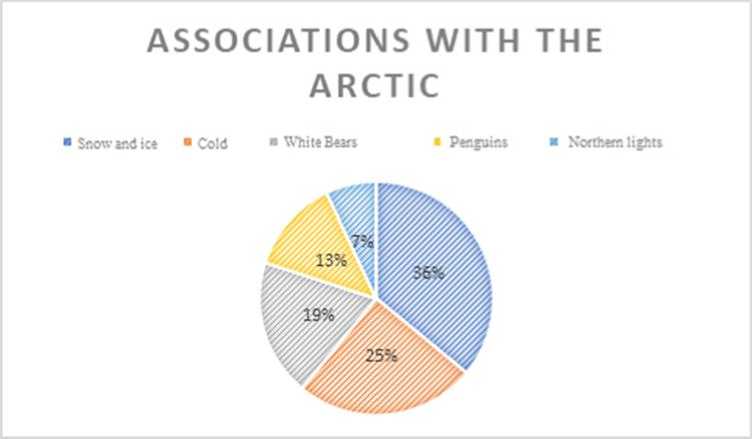
Fig. 2. The percentage ration of associations of the respondents.
More than half of respondents associate the Arctic with cold, snow, and ice (Fig. 2), and it is wholly correlated with some other similar studies [16, Nazukina M.V., p. 61]. In the last two terms, during the analysis of the results, we have united in one position. It is two states of the same sub- stance. The third most popular association was a White (polar) bear, then — Penguins and northern lights.
It would be interesting to make two points. First, the penguins do not live in the Arctic. It is evident that here we have the influence of various commercials and ignorance of the difference between the Arctic and Antarctica. Almost no absence of associations with the Arctic Ocean, an integral part of the whole region, confirms that. Three most popular associations are objective, but negatively stained, i.e., have no positive influence on the decision about a possible move to the northern regions.
The results show rather weak awareness of the youth about the Arctic region, confirmed by other surveys (Fig. 3.) — e.g., the one conducted by REGNUM in 2017 (61,895 people participated) 1.
Aware Unsure Not aware
24 4829
Aged under 18 ^^^^^^ ■ ^^^^^^^^^^^^^^^ ■ ^^^^^^^^^™
28 4626
18-50 ^^^^^™^^^^^^^^^™^^^^^
36 4717
51-40 ^^^^^^^^^ ■ ^^^^^ ■■ ^ ■ ^^ ■ ^^^e
42 4612
41 _ 50 ^ ■ ^ ■ ***^™i^^^^^^^^^™ ■ ж
47 4410
51-60 ^ ■■■ ^^ ■ ^ ■■ ^ ■■ ^^^^^^^^^^ ■ ^м
56 396
Aged over 60 i^^ ■ ll^^ ■■■■■ ll^^ ■ ^^ ■ l ■ ^^^^^^^^^^^^ ■■ l
-
Fig. 3. The proportion respondents by assessments of their awareness of the Arctic issues, different age groups, %.
Federal and regional authorities could organize an information campaign aimed at the promotion of the Arctic tourism brand and attracting young professionals of high wages in the Arctic zone of the Russian Federation. It is so not just for shift workers, but also for the public sector 2.
Most young people (60%) do not plan to move to the Arctic areas of Russia in the next 10–15 years (Fig. 4).
USE A FIVE-POINT SCALE TO ASSESS THE PROBABILITY THAT IN THE NEXT 10-15 YEARS, WITH A PARTICULAR GOAL (INCOME. APARTMENT, PERSONAL CIRCUMSTANCES) YOU WILL MOVE FOR TEMPORARY PERNLANENT RESIDENCE IN ONE OF THE TERRITORIES OF THE RUSSLAN ARCTIC
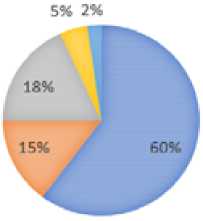
■ 2
■ 3
■ 4
■ 5
-
Fig. 4. The percentage of responses by a specified grade (1 — minimum probability; 5 — maximum).
Among the factors that negatively affect the decision about a possible move, respondents notably marked the harsh climatic conditions (half of the respondents assessed its harmful impact with the maximum grade), poor quality of life and the distance from the large cities of the European part of Russia (Fig. 5 ). Curiously, crime and lousy ecology had not influenced the decision to move: 56% and 46%, respectively. The resume of the comments could be reduced to the following: “quality of life is not so important if you come for a short time, for earning; and a crime and bad ecology are equally present everywhere in our country, regardless of area.”
USE A FIVE-POINT SCALE TO ASSESS POSSIBLE NEGATIVE IMPACT OF THE FOLLOWING F ACTORS ON DECISION ABOUT POSIBLE TEMPORARY/PERMANENT RESIDENCE IN THE TERRITORY WITH SEVERE CLIMATIC CONDITIONS
■ 1 12 «3 "4 15
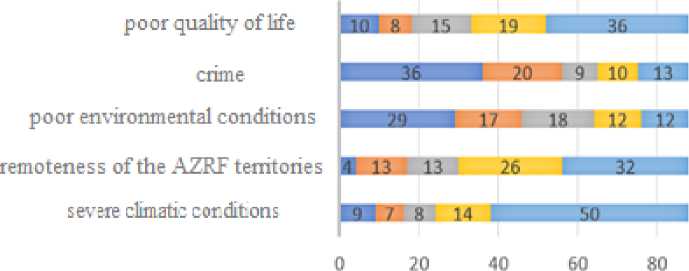
Fig. 5. The percentage of responses by a specified grade (1 — minimum probability; 5 — maximum).
Additional paid leave and rental housing have been named notable for a favorable decision about the move (Fig. 6).
USE A FIXT-POINT SCALE TO ASSESS THE IMPACT OF THE FOLLOWING FACTORS ON THE DECISION ON
TEMPORARY.7 PERMANENT RESIDENCE IN THE TERRITORY WITH SEX TRE CLIMATIC CONDITIONS
■ 1 12 ЯЗ Я4 Я$
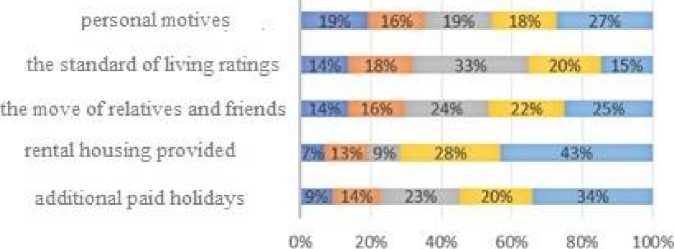
Fig. 6. The percentage of responses by a specified grade (1 — minimum probability; 5 — maximum).
These factors had determined the migratory behavior of the youth in recent decades. According to the results of similar surveys, it has been found, e.g., 76% and 26% of the students in the Murmansk Oblast called the high wages and free housing incentives to live and work in the Arctic [17, Lazhentsev V.N., p. 199]. Among the other essential factors: “improving living conditions,” “improving the quality of medicine,” “regulation of prices.”
Interesting was the question of the lower wage boundary: half of the respondents said 100– 200 thousand rubles. Almost every five (18%) would be satisfied with 100 thousand rubles, and 26% of respondents would like to get more than 200 thousand rubles (Fig. 7). Last year, the research team of the St. Petersburg Mining University received data, according to which young people were not planning to move to the Arctic but could do it for 270 thousand rubles per month. Young people who considered living in the Arctic were ready to do it for 150-200 thousand rubles per month [18, Nikulina A. et al., p. 94].
What is the minimum wage you need to move for a temporary permanent residence in one of the territories of the Arctic zone of the Russian F ederation?
20 ©
. ®e ® • • о
0 @ ^ @ © ^ ©@
0 100000 200000 300000 400000 500000
THOUSAND RUBLES
Fig. 7. The percentage of responses by a specified grade (1 — minimum probability; 5 — maximum).
Discussion
Thus, despite the clear and logical lack of desire of the Russian youth to move to the Russian Arctic, well-defined and measurable factors exist and could help to attract people to the region. Even considering the presence of substantial Soviet experience, in modern conditions, we need a fundamentally new socio-economic mechanism to attract and retain people in the newly developed areas of the North and the Arctic. Some authors point out the concept of youth migration policy, economic mechanism of crediting of population migration, and measures to attract and retain population in newly developed areas of the North and the Arctic [19, Fauzer V.V., p. 78]. This question should be approached comprehensively. Young people are interested in rental housing and a high income, but also, they need developed infrastructure: cinemas, parks, airports, malls, etc. 3
We cannot say that the Russian authorities do not pay attention to attracting young people to the Arctic region: several initiatives have been taken by Rosmolodozh 4, 5 to organize training for the Arctic in 2009. In Arkhangelsk, Northern (Arctic) Federal University named after M.V. Lomonosov (NArFU) was established. Reducing the outflow of scientific and technical personnel, increase in demand for highly skilled scientific and technical staff, and more active involvement of young professionals and scientists have been designated as the expected results of one of the sub-programs of the Russian Federation “Socio-economic development of the Russian Arctic.” It was recently extended to 2025 6.
Since 2014, the Interregional public organization “The Green Arctic” is operating to address environmental problems 7. Its headquarters is in Salekhard. At the local level, we should mention the Arctic Youth Competence Center 8, created in 2016 under the Committee on Youth Policy and Interaction with NGOs of Saint-Petersburg Government. Also noteworthy is the educational activities of the national park “Russian Arctic” 9, formed in 2011 by the Ministry of Natural Resources and Environment. Work in this direction should be continued.
Grant programs provide opportunities for the public initiative to popularize the Arctic theme. E.g., since 2017, Project Office for the Arctic development distributed more than 100 grants. For the same period, Presidential support was granted to only four projects. They received funding and apparent opportunities for growth 10.
No less necessary are and the measures by the organizations operating in the Arctic region to create a sustainable talent pool and increase employee motivation. Providing a tour to the Black Sea or the Mediterranean coast, e.g., is practiced at PJSC “FosAgro,” whose flagship company — JSC “Apatit” is in the Murmansk Oblast 11.
However, the importance in the context of the Russian Arctic development and labor shortages is the law on the Arctic zone, which will probably be adopted later this year. Some scholars explain the failure of all previous attempts of its adoption by the lack of a holistic foundation and “ideological core” [20, Pilyasov A.N., Kuleshov V.V, Seliverstov V.E., p. 15] for such a fundamental legal act, the lack of detailed knowledge of the problem and abstracting from the previous experience [21, Zhukov M.A., Kraynov V.N., p. 4]. The complete legal form of the AZRF as a state regulation object will, we believe, be a full understanding of the long-term goals and objectives as well as specific mechanisms for their achievement and implementation.
Regional leaders have significant work for the branding of territories. Its results can not only attract young people for permanent/temporary residence but also increase the tourist flow necessary to create a logical structure of the organizational and legal conditions, considering the experience of the other Arctic states [22, Dawson D., Johnston M., Stewart E.]. A decisive step in this direction that sets the strategic priorities for the development was the recent approval of the concept of the federal target program “Development of domestic tourism in the Russian Federation (2019– 2025 years)” (approved by the Federal Government on May 5, 2018, No. 872-r). An entire chapter is devoted to the development of a promising tourist investment project, “Russian Arctic.” The document also underlined the importance of policies to create an environment to encourage youth's interest in the historical and cultural heritage of Russia 12.
Conclusion
The solution to the population outflow problem in the Russian Arctic and attracting labor resources requires a comprehensive approach. Numerous government initiatives, in our opinion, work much better if a law on the Russian Arctic will be adopted. The conditions of the Arctic settlement policy of the USSR had changed. These changes happened due to common reasons for all Russia.
The current Far North policy requires a revision in the context of the state's strategic priorities, goals, and objectives for the sustainable development of the Arctic.
At the end of our research, we found out that despite the general reluctance of Russian youth to move to the Russian Arctic, as well as the superficial notion of the region, quite specific, measurable, and quantitative indicators exist. First, it is financial incentives: rental housing, higher wages, and additional paid holidays. And only after that young people think about personal motives, moving of family members, etc. These rates and a broad awareness-raising campaign on the possibilities for young people in the Arctic should be a ground for current state policy in the region. It is gradually gaining institutional and regulatory clearance now.
We hope our study and other surveys will serve both a fundamental basis for further monitoring of the situation and a tool to improve the socio-economic policy in the Russian Arctic.
Acknowledgments and funding
The author expresses his gratitude to the Project Office for the Development of the Arctic (PODA) for the financing of 50 thousand rubles granted on the 21st October 2018 for the project “Hosting the educational event “Day of the Arctic.”
Список литературы Migration attitudes and mechanisms for attracting young people to the Russian Arctic
- Konyshev V.N., Sergunin A.A., Subbotin S.V. Sotsial'naya mobil'nost' v rossiyskoy Arktike [Social mobili-ty in the Russian Arctic]. Natsional'nye interesy prioritety i bezopasnost' [National Interests: Priorities and Security], 2017, vol. 13, no. 6, pp. 1189–1196 (In Russ.)
- Pilyasov A.N. Russia’s Arctic frontier: Paradoxes of development. Reg. Res. Russ, 2016, vol. 6, no. 3, pp. 227–239.
- Andrienko Y., Guriev S. Understanding Migration in Russia, 2005. 46 p.
- Heleniak T.E. The role of attachment to place in migration decisions of the population of the Russian North. Polar Geogr., 2009, vol. 32, no. 1–2, pp. 31–60.
- Vityazeva V.A., Kotyrlo E.S. Sotsial'no-ekonomicheskoe razvitie Rossiyskogo i zarubezhnogo Severa [Socio-economic development of the Russian and foreign North.]. Syktyvkar, SGU Publ., 2007. 298 p. (In Russ.)
- Mikkola J., Käpylä H. Contemporary Arctic Meets World Politics: Rethinking Arctic Exceptionalism in the Age of Uncertainty. The Global Arctic Handbook, Springer International Publishing, 2019, iss. Springer I., pp. 153–169. DOI: 10.1007/978-3-319-91995-9_10
- Galimullin E.Z. Sotsial'no-ekonomicheskoe razvitie sub"ektov «Arkticheskoy zony Rossiyskoy Feder-atsii» v kontekste ustoychivogo razvitiya regiona [Socio-economic development of the sub-projects of the “Arctic zone of the Russian Federation” in the context of sustainable development of the region]. Materialy II Mezhdunarodnoy nauchno-prakticheskoy konferentsii «Bezopasnost' prirodopol'zovaniya v usloviyakh ustoychivogo razvitiya» [Proc. Int. sci.-practical conf. “Environmental Management in Sustainable Development”]. FGBOU VO «IGU», Geogr. Fak, 2018, pp. 269–273 (In Russ.)
- Ivanova M.V. Sovremennye predposylki budushchego arkticheskikh trudovykh resursov [Modern background for the future of Arctic labor]. Sotsiologiya truda [Sociology of labor], 2017, vol. 6, no. 142, pp. 180–198. DOI: 10.14515/monitoring.2017.6.08 (In Russ.)
- Tatarkin A.I., Loginov V.G., Zakharchuk E.A. Socioeconomic problems in development of the Russian Arctic zone. Herald of the Russian academy of sciences, 2017, vol. 87, no. 1, pp. 12–21.
- Netherlands Economic Institute. Migration from the Russian North: Profile, Mechanisms of Migration and Adjustment in Recipient Regions. Rotterdam and Moscow, 1998.
- Volgin N.A., Shirokova L.N., Mosina L.L. Aktual'nye voprosy razvitiya rossiyskogo severa: kompen-satsionnye i stimuliruyushchie sistemy, napravlennye na privlechenie i zakreplenie naseleniya v severnykh i arkticheskikh regionakh [Topical Questions of Developing the Russian North: Compensation and Incentive Systems Intended to Attract and Consolidate the Population in the Northern and Arctic Re-gions]. Uroven' zhizni naseleniya regionov Rossii [Living standards of the population in the regions of Russia], 2018, vol. 2, no. 208, pp. 34–46. DOI: 10.24411/1999-9836-2018-10013 (In Russ.)
- Leksin V.N., Porfir'ev B.N. Sotsial'no-ekonomicheskie prioritety ustoychivogo razvitiya Arkticheskogo makroregiona Rossii [Socio-Economic Priorities for the Sustainable Development of Russian Arctic Macro-Region]. Ekonomika regiona [Economy of region], 2017, vol. 13, no. 4, pp. 985–1004. DOI: 10.17059/2017-4-2 (In Russ.)
- Andreassen N. Arctic energy development in Russia — How «sustainability» can fit? Energy Research & Social Science, 2016, vol. 16, pp. 78–88.
- Leksin V.N., Porfir'ev B.N. Sostoyanie i zadachi gosudarstvennogo upravleniya sotsial'no-ekonomicheskim razvitiem rossiyskoy Arktiki: pravovoy aspekt [Current State and Goals of Russian Arctic Legal Regulation of Socio-Economic Development]. Voprosy gosudarstvennogo i munitsi-pal'nogo upravleniya [Public administration issues], 2018, vol. 2, pp. 114–138. (In Russ.)
- Tuhkunen A. Between Location and a Sense of Place Observations Regarding Young People’s Migra-tion Alacrity in Northern Europe. Tampere: University of Tampere Publ., 2007. 2002 p.
- Nazukina M.V. Osnovnye trendy pozitsionirovaniya regionov Rossiyskoy Arktiki [Major trends ranking of Russia’s Arctic regions]. Labirint. Zhurnal sotsial'no-gumanitarnykh issledovaniy [Labyrinth. Journal of Philosophy and Social Sciences], 2013, vol. 5, pp. 59–68. (In Russ.)
- Lazhentsev V.N. Prostranstvennye i vremennye tendentsii sotsial'no-ekonomicheskikh protsessov na Rossiyskom Severe [Spatial and temporal trends of socio-economic processes in the Russian North]. Moscow; Syktyvkar, 2012, pp. 198–200. (In Russ.)
- Nikulina A., et al. Factors for mobilizing human resources to work in the Arctic. Arktika: istoriya i sov-remennost': trudy ezhegodnoy mezhdunarodnoy nauchnoy konferentsii [Arctic: history and modernity: proc. ann. int. sci. conf.]. Saint Petersburg, POLITEKh-PRESS Publ., 2019, pp. 90–98 (In Russ.)
- Fauzer V.V. Demograficheskiy potentsial severnykh regionov Rossii — faktor i uslovie ekonomich-eskogo osvoeniya arktiki [The demographic potential of the northern regions of Russia — a factor and condition for the economic development of the Arctic]. Ekonomika regiona [Economy of region], 2014, vol. 34, no. 985, pp. 69–81. (In Russ.)
- Pilyasov A.N., Kuleshov V.V, Seliverstov V.E. Arctic Policy in an Era of Global Instability: Experience and Lessons for Russia. Regional research of Russia, 2015, vol. 5, no. 1, pp. 10–22. DOI: 10.1134/S2079 970515010086 (In Russ.)
- Zhukov M.A., Kraynov V.N. Problemy normativno-pravovogo zakrepleniya Arkticheskoy zony Ros-siyskoy Federatsii [Problems of legal consolidation of the Arctic zone of the Russian Federation]. No-vyy Dal'niy Vostok [New Far East], 2008, pp. 2–33. (In Russ.)
- Dawson D., Johnston M., Stewart E. The unintended consequences of regulatory complexity: the case of cruise tourism in Arctic Canada. Mar. Policy, 2017, vol. 76, February, pp. 71–78.

